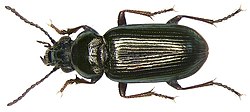| Pogonini | |
|---|---|
 | |
| Pogonus senegalensis, France | |
| Scientific classification | |
| Domain: | Eukaryota |
| Kingdom: | Animalia |
| Phylum: | Arthropoda |
| Class: | Insecta |
| Order: | Coleoptera |
| Suborder: | Adephaga |
| Family: | Carabidae |
| Subfamily: | Trechinae |
| Tribe: | Pogonini Laporte, 1834 |
Pogonini is a tribe of ground beetles in the family Carabidae. There are about 12 genera and more than 80 described species in Pogonini. More than half the species are in the genus Pogonus.
Contents
The species of Pogonini, except those in the South American genus Ochtozetus, live in saline habitats inland or along ocean coastlines. [1] [2]